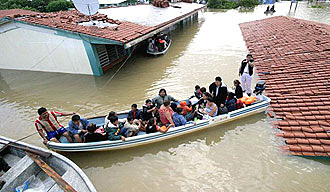 |
 |
 |
 Editorials | Environmental | December 2007 Editorials | Environmental | December 2007  
Global Warming Brings Busy Year for UN Disaster Teams
 Jo Tuckman - Guardian Limited Jo Tuckman - Guardian Limited
go to original


| | Residents of Villahermosa, the capital of the state of Tabasco, are rescued by the Mexican navy. (Gilberto Villasana/AFP/Getty Images) |
The United Nations office that sends expert teams around the world to help governments deal with natural disasters was busier than ever in Latin America this year, a fact it at least partially blames on climate change.

The UN Office for the Coordination of Humanitarian Affairs, or OCHA, said in a statement that a record nine missions were dispatched to the region during 2007, among 14 sent around the globe, itself a higher than usual number.

Of the 14 global missions, 70% were in response to hurricanes and floods, the OCHA statement said, calling this "possibly a glimpse of the shape of things to come given the reality of climate change."

In Latin America the proportion was even higher.

There were the rains in November that left most of the southern Mexican state of Tabasco under water for weeks, including large parts of the city of Villahermosa.

In October, Tropical Storm Noel triggered flash floods in the Dominican Republic that killed dozens. In September, Honduras faced the category five Hurricane Felix, just as Jamaica and Belize had been battered by the similarly strong Hurricane Dean the month before.

In South America, Uruguay suffered its worst flooding in 50 years and hundreds of thousands of Bolivians were inundated and their crops ruined at the beginning of the year, warranting two UN missions alone.

The remaining UN disaster team sent to the region went to help with the relief effort following an 8.0-magnitude earthquake along the Peruvian coast.

There were also other significant disasters which did not receive UN attention because the teams were not invited in by the local government. Hurricane Felix caused its greatest devastation in Nicaragua, but the UN mission was only sent to neighbouring Honduras.

"The number of disasters is increasing and it is connected to climate change but we cannot at this juncture directly link any one incident," OCHA spokesperson Stephanie Bunker told the Guardian. "More studies will have to be done before that is possible."

In 2006, the number of missions to Latin America was just two. In 2005 it was five.

Previously the highest number of missions to the region was the eight sent in 1998 after Hurricanes Mitch devastated Central America and Hurricane Georges ripped through the Caribbean.

Since its establishment in 1993, the OCHA has sent 167 disaster assessment missions. The largest number were in response to the tsunami and earthquake that killed around 230,000 people in 12 Indian Ocean nations on Boxing Day 2004. This year, aside from the missions to Latin America, the UN also sent teams to Madagascar, Pakistan, and Ghana in response to floods, as well as to the Solomon Islands following an earthquake and tsunami, and to Laos to help with disaster preparedness efforts. | 
 | |
 |



